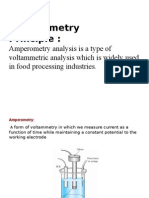0 ratings0% found this document useful (0 votes)
20 views2 pagesThe Future of Energy: Hydrogen Generators
Hydrogen generators represent a
revolutionary development in the pursuit of sustainable
and renewable energy sources. As the world seeks
alternatives to fossil fuels, hydrogen stands out due to its
abundance and potential for zero-emission energy
production. This article explores the advancements in
hydrogen generator technology, their applications, and
the role they will play in the future energy landscape.
Copyright
© © All Rights Reserved
We take content rights seriously. If you suspect this is your content, claim it here.
Available Formats
Download as PDF, TXT or read online on Scribd
0 ratings0% found this document useful (0 votes)
20 views2 pagesThe Future of Energy: Hydrogen Generators
Hydrogen generators represent a
revolutionary development in the pursuit of sustainable
and renewable energy sources. As the world seeks
alternatives to fossil fuels, hydrogen stands out due to its
abundance and potential for zero-emission energy
production. This article explores the advancements in
hydrogen generator technology, their applications, and
the role they will play in the future energy landscape.
Copyright
© © All Rights Reserved
We take content rights seriously. If you suspect this is your content, claim it here.
Available Formats
Download as PDF, TXT or read online on Scribd
You are on page 1/ 2
Volume 9, Issue 6, June – 2024 International Journal of Innovative Science and Research Technology
ISSN No:-2456-2165 https://doi.org/10.38124/ijisrt/IJISRT24JUN692
The Future of Energy: Hydrogen Generators
Jafar Allajami
Saudi Aramco
Abstract:- Hydrogen generators represent a C. Decentralized Production and Distribution
revolutionary development in the pursuit of sustainable Small-scale, decentralized hydrogen generators enable
and renewable energy sources. As the world seeks localized production of hydrogen, reducing the need for
alternatives to fossil fuels, hydrogen stands out due to its extensive transportation infrastructure. This approach
abundance and potential for zero-emission energy minimizes energy losses and lowers the risk of supply chain
production. This article explores the advancements in disruptions. Innovations in compression and storage
hydrogen generator technology, their applications, and technologies have made it feasible to produce and store
the role they will play in the future energy landscape. By hydrogen efficiently at various scales, from small residential
examining the benefits and challenges associated with units to large industrial plants.
hydrogen generators, this paper highlights their potential
to transform the energy sector. III. APPLICATIONS OF HYDROGEN
GENERATORS
I. INTRODUCTION
A. Transportation
The global energy landscape is undergoing a significant Hydrogen fuel cells are being increasingly adopted in
transformation as the need for cleaner and more sustainable the transportation sector, offering a clean and efficient
energy sources becomes increasingly urgent. Hydrogen, the alternative to traditional internal combustion engines.
most abundant element in the universe, offers a promising Hydrogen-powered vehicles, including cars, buses, and
solution. Hydrogen generators, which produce hydrogen trucks, produce only water vapor as a byproduct, reducing
through various methods, including electrolysis, are at the greenhouse gas emissions. The development of hydrogen
forefront of this energy revolution. This article aims to refueling infrastructure is critical to the widespread adoption
explore the future of hydrogen generators, focusing on their of hydrogen vehicles. Hydrogen generators at refueling
technological advancements, applications, and the impact stations can produce hydrogen on-site, ensuring a steady
they will have on energy production and consumption. supply and reducing transportation costs.
II. ADVANCEMENTS IN HYDROGEN B. Industrial Use
GENERATOR TECHNOLOGY Hydrogen is used in various industrial processes,
including ammonia production, petroleum refining, and steel
A. Electrolysis Efficiency manufacturing. Hydrogen generators provide a clean and
Modern hydrogen generators utilize advanced efficient way to produce hydrogen for these applications,
electrolysis techniques to split water into hydrogen and reducing the carbon footprint of industrial operations. The use
oxygen with high efficiency. Innovations such as Proton of green hydrogen in industrial processes is gaining traction,
Exchange Membrane (PEM) and Solid Oxide Electrolysis with several pilot projects demonstrating the feasibility and
Cell (SOEC) technology have significantly improved the benefits of transitioning to hydrogen-based methods.
efficiency and scalability of hydrogen production. Recent
developments in catalyst materials, such as platinum-free C. Power Generation and Storage
catalysts, have reduced the cost and increased the durability Hydrogen can be used in fuel cells to generate
of electrolyzers, making hydrogen production more electricity, providing a clean and efficient power source for
economically viable. residential, commercial, and industrial applications.
Hydrogen fuel cells are particularly useful in remote areas
B. Integration with Renewable Energy where grid connectivity is limited. Hydrogen storage systems
Hydrogen generators can be integrated with renewable enable the capture and storage of excess renewable energy,
energy sources like solar and wind power to produce green which can be converted back into electricity when needed.
hydrogen. This integration helps in utilizing excess energy This capability enhances the stability and reliability of
generated during peak production times, thereby stabilizing renewable energy systems.
the grid and reducing reliance on fossil fuels. Advanced
energy storage systems allow hydrogen to be stored and used IV. CONCLUSION
when renewable energy production is low, providing a
reliable and consistent energy supply. Hydrogen generators are poised to play a pivotal role in
the future of energy, offering a sustainable and versatile
solution to the world’s energy challenges. With advancements
in technology and increasing integration with renewable
energy sources, hydrogen production is becoming more
efficient and economically viable. The applications of
IJISRT24JUN692 www.ijisrt.com 2314
Volume 9, Issue 6, June – 2024 International Journal of Innovative Science and Research Technology
ISSN No:-2456-2165 https://doi.org/10.38124/ijisrt/IJISRT24JUN692
hydrogen generators in transportation, industrial processes,
and power generation highlight their potential to transform
the energy landscape. As the world continues to seek cleaner
and more sustainable energy sources, hydrogen stands out as
a key component of a greener future.
REFERENCES
[1]. Ball, M., & Weeda, M. (2015). The Hydrogen
Economy: Vision or Reality? International Journal of
Hydrogen Energy, 40(25), 7903-7919.
[2]. Ogden, J. M., & Yang, C. (2016). Build-Up of a
Hydrogen Infrastructure in the US. Energy Policy,
39(3), 927-939.
[3]. IEA. (2019). The Future of Hydrogen: Seizing
Today’s Opportunities. International Energy Agency.
[4]. Staffell, I., Scamman, D., Abad, A. V., & Ward, K. R.
(2019). The Role of Hydrogen and Fuel Cells in the
Global Energy System. Energy & Environmental
Science, 12(2), 463-491.
[5]. Dutta, S. (2014). A Review on Production, Storage of
Hydrogen and Its Utilization as an Energy Resource.
Journal of Industrial and Engineering Chemistry,
20(4), 1148-1156.
[6]. Alazemi, J., & Andrews, J. (2015). Automotive
Hydrogen Fuel Cell Vehicles: Current Status and
Future Prospect. Journal of Renewable and
Sustainable Energy, 7(1), 011301.
IJISRT24JUN692 www.ijisrt.com 2315
You might also like
- The Subtle Art of Not Giving a F*ck: A Counterintuitive Approach to Living a Good LifeFrom EverandThe Subtle Art of Not Giving a F*ck: A Counterintuitive Approach to Living a Good Life4/5 (6454)
- Responding and Identifying to Developmental Delay in ChildrenNo ratings yetResponding and Identifying to Developmental Delay in Children14 pages
- Efficient Misinformation Detection on Twitter: A Hybrid Approach Using Machine Learning and Bayesian Optimization with HyperbandNo ratings yetEfficient Misinformation Detection on Twitter: A Hybrid Approach Using Machine Learning and Bayesian Optimization with Hyperband13 pages
- Factors Influencing Consumer Buying Behavior of Toe Gold and Jewelry ShopNo ratings yetFactors Influencing Consumer Buying Behavior of Toe Gold and Jewelry Shop10 pages
- A Study on the Mechanical Integrity and Pushability of Distal Access Catheters: Quality Control Data AnalysisNo ratings yetA Study on the Mechanical Integrity and Pushability of Distal Access Catheters: Quality Control Data Analysis9 pages
- Hidden Figures: The American Dream and the Untold Story of the Black Women Mathematicians Who Helped Win the Space RaceFrom EverandHidden Figures: The American Dream and the Untold Story of the Black Women Mathematicians Who Helped Win the Space Race4/5 (1022)
- The World Is Flat 3.0: A Brief History of the Twenty-first CenturyFrom EverandThe World Is Flat 3.0: A Brief History of the Twenty-first Century3.5/5 (2289)
- Handbook of Chemistry - Arihant @neetquestionpaper90% (10)Handbook of Chemistry - Arihant @neetquestionpaper574 pages
- Experimental Analysis of Formula 1 Cars Moving Under Wake ConditionsNo ratings yetExperimental Analysis of Formula 1 Cars Moving Under Wake Conditions6 pages
- CH 1.4 Electrolytic Cell Chemistry F5 KSSMNo ratings yetCH 1.4 Electrolytic Cell Chemistry F5 KSSM87 pages
- Slum Dwellers’ Access to Urban Basic Services: A Study of Two Informal Settlements in Dhaka CityNo ratings yetSlum Dwellers’ Access to Urban Basic Services: A Study of Two Informal Settlements in Dhaka City9 pages
- Economic Viability of Sericulture in Comparison to Conventional Crop Cultivation in Korinthakunta Thanda, TelanganaNo ratings yetEconomic Viability of Sericulture in Comparison to Conventional Crop Cultivation in Korinthakunta Thanda, Telangana9 pages
- The Importance of Emotional Stability for Nigerian Women in Political PositionsNo ratings yetThe Importance of Emotional Stability for Nigerian Women in Political Positions21 pages
- An Evaluation of the Patients' Access to Adequate Nutritional Screening in a Tertiary Care Hospital in Order to Receive the Proper Dietary GuidelinesNo ratings yetAn Evaluation of the Patients' Access to Adequate Nutritional Screening in a Tertiary Care Hospital in Order to Receive the Proper Dietary Guidelines15 pages
- Customer Perception and Service Quality - A Comparative Study Among Traditional and Neo BanksNo ratings yetCustomer Perception and Service Quality - A Comparative Study Among Traditional and Neo Banks7 pages
- Amplifying the Importance of Synchronic- Diachronic Approaches in Social Sciences Research: Unleashing the Power of this Technique for Better Sociocultural AnalysisNo ratings yetAmplifying the Importance of Synchronic- Diachronic Approaches in Social Sciences Research: Unleashing the Power of this Technique for Better Sociocultural Analysis6 pages
- The Impact of Parental Involvement on the GPA of South Asian American Highschool Students in New JerseyNo ratings yetThe Impact of Parental Involvement on the GPA of South Asian American Highschool Students in New Jersey23 pages
- Extraction of Balanites aegyptiaca Seed Oil and Its Application in Soap Production from the Wood AshNo ratings yetExtraction of Balanites aegyptiaca Seed Oil and Its Application in Soap Production from the Wood Ash5 pages
- The Effect of Technological Advances on Music in TunisiaNo ratings yetThe Effect of Technological Advances on Music in Tunisia4 pages
- Administrative Gatekeeping and Informal Hierarchies: Exploring Role Ambiguity and Power Dynamics Between Head Office and Peripheral Staff in the Public SectorNo ratings yetAdministrative Gatekeeping and Informal Hierarchies: Exploring Role Ambiguity and Power Dynamics Between Head Office and Peripheral Staff in the Public Sector6 pages
- Digital Epidemiology in Action: A Cross-Platform Review of Social Media and Internet-Based Surveillance for Infectious Disease OutbreaksNo ratings yetDigital Epidemiology in Action: A Cross-Platform Review of Social Media and Internet-Based Surveillance for Infectious Disease Outbreaks9 pages
- A Study on the Structural and Tensile Behaviour of Tasar and Eri Spun Silk YarnsNo ratings yetA Study on the Structural and Tensile Behaviour of Tasar and Eri Spun Silk Yarns9 pages
- Angelman Syndrome: An Updated Review of Pathophysiology, Diagnosis and ManagementNo ratings yetAngelman Syndrome: An Updated Review of Pathophysiology, Diagnosis and Management6 pages
- Balancing Continuous Service and Budget Constraints: A Comparative Analysis of Shift Systems in Public Agricultural Services and Private Sector OperationsNo ratings yetBalancing Continuous Service and Budget Constraints: A Comparative Analysis of Shift Systems in Public Agricultural Services and Private Sector Operations5 pages
- The Problem of Youth Entrepreneurship Development in KyrgyzstanNo ratings yetThe Problem of Youth Entrepreneurship Development in Kyrgyzstan7 pages
- Engineering-Economic Comparison of Grid-Tied and Standalone Solar Energy Solutions for Sustainable Rural ElectrificationNo ratings yetEngineering-Economic Comparison of Grid-Tied and Standalone Solar Energy Solutions for Sustainable Rural Electrification9 pages
- Science Teachers Strategies for Developing Entrepreneurial Skills through Teaching and Learning of Science in Higher Institutions in NigeriaNo ratings yetScience Teachers Strategies for Developing Entrepreneurial Skills through Teaching and Learning of Science in Higher Institutions in Nigeria5 pages
- Inclusive Classrooms, Inclusive Readers: Examining Learners’ Reading Behaviours in a Ghanaian Inclusive SchoolNo ratings yetInclusive Classrooms, Inclusive Readers: Examining Learners’ Reading Behaviours in a Ghanaian Inclusive School11 pages
- An Investigation into Primary Healthcare Workers’ Awareness and Practical Application of the Partograph in Ilorin Metropolis, Kwara State, NigeriaNo ratings yetAn Investigation into Primary Healthcare Workers’ Awareness and Practical Application of the Partograph in Ilorin Metropolis, Kwara State, Nigeria8 pages
- Cycle Time Optimization of Coal Hauling from SWA Block to ROM Aster Using Six Sigma DMAIC ApproachNo ratings yetCycle Time Optimization of Coal Hauling from SWA Block to ROM Aster Using Six Sigma DMAIC Approach6 pages
- Same Old Story: The Role of Capital and Labor to SME PerformanceNo ratings yetSame Old Story: The Role of Capital and Labor to SME Performance8 pages
- Real Time Scheduling of an Automotive MaintenanceNo ratings yetReal Time Scheduling of an Automotive Maintenance14 pages
- In the Context of Treating Breast Cancer, Which Dosimetric Advantages do Volumetric Intensity- Modulated Radiotherapy by Arc Therapy and 3D Conformal Radiotherapy Offer?No ratings yetIn the Context of Treating Breast Cancer, Which Dosimetric Advantages do Volumetric Intensity- Modulated Radiotherapy by Arc Therapy and 3D Conformal Radiotherapy Offer?9 pages
- Evaluation of the Hypoglycemic Potential of the Ethanolic Bulb Extract of Allium Chinense G. Don (Sibujing) on High-Glucose Induced Hyperglycemic Swiss Albino MiceNo ratings yetEvaluation of the Hypoglycemic Potential of the Ethanolic Bulb Extract of Allium Chinense G. Don (Sibujing) on High-Glucose Induced Hyperglycemic Swiss Albino Mice10 pages
- 5852-004-001-PVG-U-003_PG Test ProcedureNo ratings yet5852-004-001-PVG-U-003_PG Test Procedure18 pages
- TPTG620-6th Assignment - Lesson Plans - Spring 2024No ratings yetTPTG620-6th Assignment - Lesson Plans - Spring 202439 pages
- ELECTROCHEMISTRY (CH-202) (Q & A) 1st MidNo ratings yetELECTROCHEMISTRY (CH-202) (Q & A) 1st Mid12 pages
- Chemistry General: Chapter 20: ElectrochemistryNo ratings yetChemistry General: Chapter 20: Electrochemistry56 pages
- Wbshiksha-Com - Translate.goog-Madhyamik Physical Science Suggestion 2023 PDF Secondary Physics Suggestion 2023No ratings yetWbshiksha-Com - Translate.goog-Madhyamik Physical Science Suggestion 2023 PDF Secondary Physics Suggestion 20234 pages
- Chemistry SCIENCE Paper - 2: (Two Hours)No ratings yetChemistry SCIENCE Paper - 2: (Two Hours)9 pages
- Determination of Avogadro's Number Using ElectrogravimetryNo ratings yetDetermination of Avogadro's Number Using Electrogravimetry8 pages
- Electrolytic Concentration of Aqueous Solutions of Nitric Acid. I. Henry Jermain Maude CreightonNo ratings yetElectrolytic Concentration of Aqueous Solutions of Nitric Acid. I. Henry Jermain Maude Creighton7 pages
- Electrolys IS: By: Dwayne Coelho and Beverly BrittoNo ratings yetElectrolys IS: By: Dwayne Coelho and Beverly Britto12 pages
- CPUT Physical Chemistry 4 Learner Guide 2017No ratings yetCPUT Physical Chemistry 4 Learner Guide 20176 pages
- SR - CHEMISTRY-most Important LAQ, SAQ'S - 1 - (2022-23)No ratings yetSR - CHEMISTRY-most Important LAQ, SAQ'S - 1 - (2022-23)4 pages
- Activity Sheet-30 (Electrolysis of Molten CPDS)No ratings yetActivity Sheet-30 (Electrolysis of Molten CPDS)3 pages
- Devil in the Grove: Thurgood Marshall, the Groveland Boys, and the Dawn of a New AmericaFrom EverandDevil in the Grove: Thurgood Marshall, the Groveland Boys, and the Dawn of a New America4.5/5 (280)
- Never Split the Difference: Negotiating As If Your Life Depended On ItFrom EverandNever Split the Difference: Negotiating As If Your Life Depended On It4.5/5 (1005)
- A Heartbreaking Work Of Staggering Genius: A Memoir Based on a True StoryFrom EverandA Heartbreaking Work Of Staggering Genius: A Memoir Based on a True Story3.5/5 (233)
- The Hard Thing About Hard Things: Building a Business When There Are No Easy AnswersFrom EverandThe Hard Thing About Hard Things: Building a Business When There Are No Easy Answers4.5/5 (361)
- The Gifts of Imperfection: Let Go of Who You Think You're Supposed to Be and Embrace Who You AreFrom EverandThe Gifts of Imperfection: Let Go of Who You Think You're Supposed to Be and Embrace Who You Are4/5 (1175)




































































































